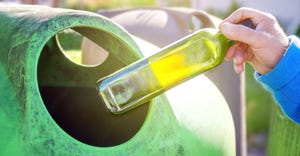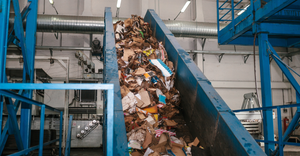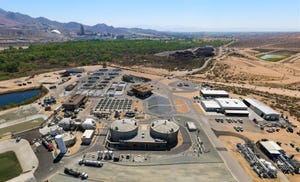Examining the Latest Developments in Converting Organic Waste into Renewable Energy
With municipalities increasingly collecting organic waste, finding ways to convert that waste into clean energy is a hot topic in the solid waste industry.
A multitude of techniques are in use or being developed, including aerobic and anaerobic digestion, as well as other methods for converting organic waste into biofuels or other forms of renewable energy.
Waste360 recently sat down with David McConnell, vice president of business development, North America for Enerkem Inc. headquartered in Montreal, Canada; and Topher Gudmand, director of sales for Wellesley, Mass.-based Vanguard Renewables, to discuss these trends.
McConnell and Gudmand will participate in the “Renewable Energy, Biofuels, Anaerobic Digestion of MSW and Agricultural Waste” session from 1:30 to 3 p.m. June 7 at this year’s Waste Expo. They will be joined by Jeff Draper, a vice president with Zero Waste Energy LLC and BethAnn Taylor with Taylor Environmental. McConnell will focus on “Renewable Chemicals and Biofuels from Waste to Close the Loop of the Circular Economy” while Gudmand explains “The Power Behind Farm Powered: Highlighting the Benefits of Farm-Based Anaerobic Digestion”.
Waste360: How can renewable chemicals and biofuels from waste close the loop of the circular economy?
David McConnell: Producing renewable chemicals from waste helps accelerate the transition to a circular economy where waste becomes a resource for the production of everyday products. Enerkem’s biofuels renewable chemicals are derived from waste instead of fossil fuels. Our facilities help diversify the energy mix and make greener everyday products, while offering a sustainable and economical alternative to landfilling, incineration and traditional fuels and chemicals.
Waste360: What are the benefits of renewable chemicals and biofuels from waste?
David McConnell: The use of waste to produce renewable chemicals and biofuels helps reduce our dependence on fossil fuels. It also represents a sustainable waste management solution that is complementary to recycling and composting.
Our technology uses waste materials normally destined to landfill or incineration, such as textiles, non-recyclable plastics, wood residues, or soiled food containers. In addition to reducing landfilling and avoiding the creation of new landfill capacity, the use of municipal solid waste as a feedstock for the production of biofuels offers important advantages: it does not compete with food supply, it does not have land use impact, and it is already collected via the waste management industry’s existing collection, distribution and logistics infrastructure. It is a sustainable alternative to the challenges associated with waste disposal.
Finally, this solution equally answers the question of how to dispose of rapidly accumulating non-recyclable and non-compostable garbage, while avoiding methane emissions for its decomposition in landfills and creating value-added products from otherwise useless waste.
Waste360: What are the challenges of renewable chemicals and biofuels from waste?
David McConnell: The main challenge for all clean tech companies is financing the scale-up plan and building the first-of-kind commercial facility. Many of our efforts therefore went into successfully raising the capital required to take our breakthrough industrial innovation from lab to commercial stage.
Waste360: What are the most popular or successful methods for creating renewable chemicals and biofuels from waste?
David McConnell: The current most popular and successful methods for creating renewable chemicals and biofuels from waste streams are anaerobic digestion of food waste streams and the production of biodiesel from waste vegetable oil. The challenge now is to convert heterogeneous waste streams that are not recyclable and not compostable (or digestible) into value-add products such as chemicals and fuels. This is what Enerkem is focusing on.
There are several operations in the U.S. that have demonstrated great progress in processing solid waste and are moving to the commercial operations. Several successful operations that come to mind are: AltAir Fuels that is producing renewable jet and diesel fuel from inedible agricultural waste oils and fats. Anaergia Inc. and Zero Waste Inc. have several facilities operation producing biogas.
Waste360: Explain the process of farmed-based anaerobic digestion (AD).
Topher Gudmand: The best analogy is to compare it to a cow's stomach. We put food in and inside the tank billions of methanogens eat, digest and convert the food into methane, which in turn is used to power an engine. This engine drive a generator that creates electricity that is used on the farm and sold back to the grid.
Waste360: What are the benefits of farmed-based AD?
Topher Gudmand: …The benefits of farm-based AD are as follows:
Sequester 85 percent of greenhouse gases (GHG) from the host farms agricultural operation
Sequester 100 percent of the GHG from the diverted organic waste stream that we pull from the surrounding industries (food processing, grocery stores, restaurant, etc.)
With the combination of manure, food waste and other components we are able to generate a very efficient feedstock for the maximum amount of energy production from the combined waste.
The by-product of methane production is a perfect organic fertilizer from the farmer's feed crops.
Produce 1 MW/h for every 100 tons of waste processed. Energy that would never be realized without the food waste diversion efforts.
Generate enough heat from the engine to heat the entire farm operation including adjacent homes and buildings.
Help the farm family with nutrient loading of the soil by controlling the amounts of certain nutrients that are filtered out in the process.
Create a clean bedding for the animals as a process of solid separation that enables to farmer to save on purchasing any additional bedding
Produces a renewable energy, closed loop environment where nothing is wasted and the environmental impact is minimalized due to the lack of hauling materials over great distances.
Provides a waste generator or hauler a destination that they can be proud of and market the farm-powered ideals to their customers.
Waste360: What are the challenges of farmed-based AD?
Topher Gudmand: Too many challenges to go into detail but here are the major ones.
It is extremely expensive to fund. Each digester facility can cost upwards of $7 to $8 million for each megawatt of capacity. The regulatory process is long, tedious and also expensive. Trying to adhere to all the regulations from the environmental, energy, and agricultural regulators can be exhausting if you are unfamiliar with the correct steeps and do not have all the information at hand.
The most daunting risk is finding the requisite feedstock to make sure the systems run at an effective capacity. The relatively new premise of food waste diversion has not been widely adopted so finding the correct sources of fuel is very difficult.
The operation of an AD system is inexact at best. With the variability of the inputs being so broad in range it is difficult to predict how the system will perform at any given time. We have been trying to perfect the systems for five years and still don't have it running as well as we would like. The future of this new industry is uncharted and unknown.
Waste360: What are some of the most successful AD operations in the U.S.?
Topher Gudmand: So far we think ours are the best. There are more 8,000 operational in Germany and an additional 4,000 more across Europe. Canada also is 10 years ahead of us and we can learn many important lessons from the systems up there.
About the Author
You May Also Like


